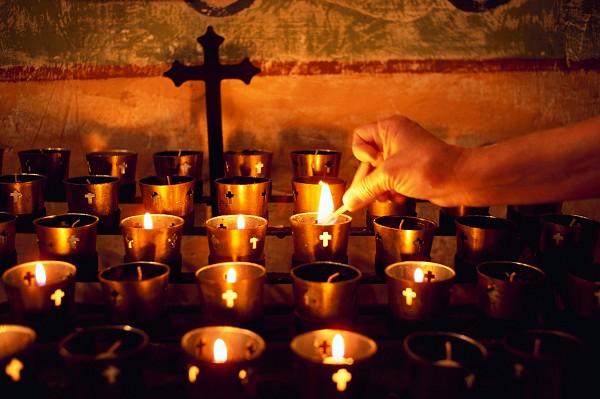We have just entered the month of the Dead. November is a time when, as Catholics, we are reminded that the dead are still with us.
What, then, should we make of the increasingly gaudy – and gory – festival of Hallowe’en, just past? I must confess that I find Hallowe’en increasingly disturbing. Aside from the fact that the imported custom of ‘trick or treat’ – particularly when practised by older children or teenagers – can stray dangerously close to demanding milk chocolate with menaces, it seems to me that, year by year, more and more of society – from commercial interests down to little children – is encouraged to engage in a parlour game celebrating what we once recognised for what it is: evil.
In society today, the macabre costumes and other paraphernalia are treated as just a bit of fun – nothing serious. What harm is there in dressing up as a bloodied murderer or a pitchfork-wielding demon?
This attitude is reflective of a culture that has ceased to believe that there is anything beyond or above the world that we can touch and see. Talk of spirits or the like is regarded as quaint superstition, something to be laughed at.
Perception
This is not the teaching of the Church. There is a world beyond that which we can perceive, in which a dramatic battle between good and evil is constantly being fought. There are forces abroad that seek to lure souls to ruin, which are combatted daily by others trying to guide us back to our eternal home, with God.
As Catholics, we should be keenly conscious of the presence of evil in the world, in its effects, and in its personification: the devil. In the film The Usual Suspects the writers pithily expressed a thought that has been around for a long time: “The greatest trick the devil ever pulled was convincing the world he didn’t exist.”
Judging by what I have seen in the run up to Hallowe’en, the trick is working.
Hallowe’en is of course the eve of All Hallows, or All Saints. Far from being a commemoration of what is wicked, it prepares us to celebrate one of the great feasts of the Church – that of the Communion of Saints. Belief in the Communion of Saints is, quite literally, an article of faith for Catholics; it is right there in the Nicene Creed. And it is a glorious and uplifting thing.
There are in Heaven serried masses of saints, who support and intercede for us here below. The unity of the saints in their holiness can mask their striking diversity. For all of us, there is a saint for whom we can feel a special affinity, whether because of character, temperament, calling or circumstances, and who can serve as an inspiration to us.
There are saints, recognised by the Church, who have at times strayed far from the straight and narrow path. I particularly love the story of Dorothy Day, now ‘Servant of God’, who had an abortion in her youth and whose cause for canonisation is currently progressing.
Immediately following the feast of All Saints, we have the feast of All Souls, in which we remember in a special way the souls undergoing purgation.
This year, I attended Mass on the Feast of All Souls in the Latin Rite. The liturgy is rich in beauty and symbolism: the celebrant clad in a chasuble of black embroidered with gold, a bier – which normally carries a coffin – arranged before the Sanctuary, also draped in black, surrounded by six lighted candles.
We are reminded that death awaits us all, but that this is not our final destiny. So many funerals today are treated as a celebration of the life of the deceased, whose passage to Heaven (if it is thought of at all) is treated as assured. Not so. None of us knows where we are bound for, and a requiem Mass should be treated as an opportunity to pray fervently for the soul of the recently deceased person.
Purgatory
We should pray for the souls in Purgatory; perhaps the deceased is there. None of us can presume upon God’s mercy.
The ancient tradition of the Church is that those souls assisted by our prayers are made aware of this, so that they may intercede for us from Heaven. There is a beauty to this relationship of interdependence: the souls in Purgatory depend on the living to pray for them; we in this world rely on their intercession once they are admitted to eternal life with God.
I think often at this time of my ancestors – those who have gone before me, without whom I would not be here – and the debt of gratitude I owe to them. And I pray for their souls, and for the souls of all those who have died, especially those who have no-one to pray for them.
This is how the dead accompany us. Not as the gruesome spectres or gory corpses of the costumed revellers.
But as friends, as helpers, and as those in need of our help. This November, remember the dead. Remember that you will be one of them, and pray for them.


 Maria Steen
Maria Steen
